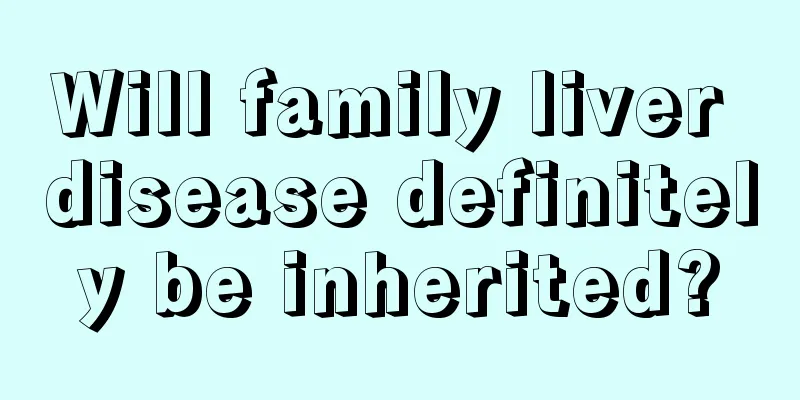Will family liver disease definitely be inherited?

|
Liver disease is a disease that everyone is familiar with. It is contagious to a certain extent. In many families, every member suffers from hepatitis B. This is not because it is hereditary, but because hepatitis B is highly contagious and other people are unfortunately infected by hepatitis B patients. Hereditary liver diseases generally include chronic hepatitis and cirrhosis. This article introduces the relevant content about infectious liver disease and hereditary liver disease. Let’s take a look. Is liver disease hereditary? Hepatitis is a serious disease that can threaten the patient's life. If not treated in time, it can develop into liver cancer. Therefore, hepatitis patients must receive timely treatment, and everyone should also pay attention to protective work in daily life. The occurrence of liver disease has a "family clustering phenomenon", and in fact there are many types of liver disease. Many people know that some hepatitis can be contagious, such as viral hepatitis. So is it possible that hepatitis can be passed on to the next generation? Let’s find out together. 1. There are many types of hepatitis. Generally speaking, there are two major categories. One is contagious and the other is hereditary. If it is hereditary hepatitis, it may be passed on to the next generation, so patients with this type of hepatitis should pay attention. 2. Hereditary hepatitis: that is, hereditary metabolic liver disease. This type of hepatitis disease can manifest as chronic hepatitis and cirrhosis, but there are very few cases of it actually developing into liver cancer. Common ones include: copper metabolism disease, iron metabolism disorder, carbohydrate metabolism disorder, lipid metabolism disorder, protein metabolism disorder and amino acid metabolism disease, etc. 3. Contagious hepatitis: All viral hepatitis are contagious, but the modes of transmission may vary slightly. The most common is hepatitis B, which tends to occur in families and is very harmful. In my country, most primary liver cancers are caused by hepatitis B virus or hepatitis C virus infection. Although hepatitis B and C are not hereditary diseases, they have a family clustering phenomenon because of their transmission routes. Since they can be transmitted from mother to child and through close contact within the family, it is easy to be infected with hepatitis B if you do not pay attention to prevention. |
<<: Are identical twins hereditary?
>>: Symptoms of hereditary heart disease
Recommend
Knee bandage method
If an area is seriously injured, especially after...
Are pumpkin and zucchini the same?
Pear melon and zucchini are both common vegetable...
How a heavy smoker ends up with lung cancer
Mr. Wang was recently admitted to the provincial ...
How to reduce swelling after getting hit on the face
The face is a very important part of the human bo...
Fitness and weight gain plan for skinny people
Many fat people particularly hate thin people and...
How to care for prostate cancer
There are many specific treatment methods for pro...
How much does it cost to rule out nasopharyngeal cancer and can it be cured?
Many people may think that if you have cancer, th...
Can I eat grape seeds if I have a bad stomach?
The grape seeds that everyone sees on the market ...
What are the causes of thyroid lesions
Thyroid lesions are also a common multiple diseas...
How to overcome acne caused by acclimatization
Since people's skin will discharge sweat and ...
Cases of thyroid cancer without surgery
If thyroid cancer is not treated with surgery, it...
Is acute gout better with diet than medication?
Many people suffer from acute gout, which can cau...
What to do if you have muscle soreness after intense exercise
Friends who do not exercise regularly often exper...
How can I wash off the oil stains on clothes
It is now late autumn and the temperature is star...
Dopamine treats renal failure
The kidney is a key organ in the human body. Meta...









